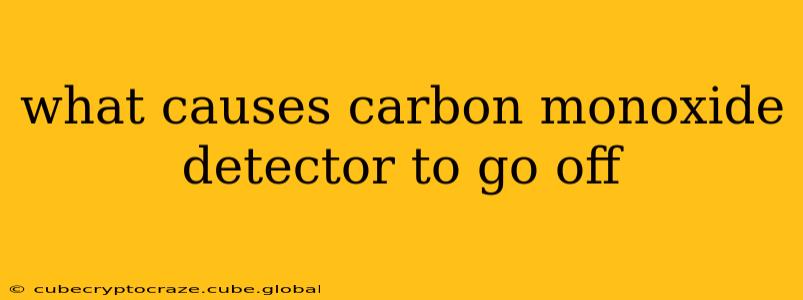What Causes a Carbon Monoxide Detector to Go Off?
A carbon monoxide (CO) detector going off is a serious event requiring immediate action. Understanding the potential causes can help you respond effectively and prevent future incidents. While a malfunctioning detector is a possibility, it's crucial to prioritize the safety implications of elevated CO levels. This article explores the common reasons for CO alarm activation, helping you stay safe and informed.
1. Presence of Carbon Monoxide:
This is the most obvious reason. Carbon monoxide is a colorless, odorless, and tasteless gas produced by the incomplete burning of fuels such as natural gas, propane, oil, wood, and charcoal. Common sources in the home include:
- Faulty Furnaces and Boilers: Cracks in heat exchangers or blocked vents can lead to CO leaks. Regular maintenance and inspections are crucial.
- Gas Stoves and Ovens: Improper ventilation or a malfunctioning appliance can release CO. Ensure proper ventilation when using gas appliances.
- Water Heaters: Similar to furnaces, faulty water heaters can leak CO. Regular servicing is essential.
- Fireplaces and Wood-Burning Stoves: Incomplete combustion in fireplaces or improperly maintained wood-burning stoves can release significant amounts of CO. Ensure adequate ventilation.
- Gas-Powered Generators: Using generators indoors or in poorly ventilated areas is extremely dangerous and a major cause of CO poisoning. Never operate a generator indoors.
- Cars and Other Vehicles: Running a car in an attached garage, even with the door open, can quickly raise CO levels to dangerous levels.
- Other Appliances: Gas dryers, clothes washers, and other appliances using gas could potentially leak CO if not properly maintained or ventilated.
2. High Humidity and Dust:
While not directly producing CO, high humidity and dust accumulation can interfere with the sensor's operation, leading to false alarms. Regularly cleaning your CO detector, according to the manufacturer's instructions, can help prevent this.
3. Detector Malfunction:
Although less common than actual CO leaks, the detector itself might malfunction. This could be due to:
- Low Battery: A low battery warning should usually precede a malfunctioning alarm, however sometimes the low battery will directly trigger the alarm itself, causing false positives. Regularly check and replace batteries as recommended.
- Expired Sensor: CO detectors have a limited lifespan. Replace the sensor as recommended by the manufacturer (typically every 5-7 years).
- Manufacturing Defect: While rare, a defective detector can trigger false alarms. Contact the manufacturer if you suspect a manufacturing defect.
4. Other Gases:
Some gases, such as hydrogen sulfide (found in sewer gas), propane, and butane, might trigger a CO detector, though it's less likely to cause a consistent alarm. The level of false positives from other gases would be quite high to register an alarm.
What to Do When Your CO Detector Goes Off:
- Evacuate Immediately: Get everyone out of the building and move to a safe location, such as a neighbor's house.
- Call Emergency Services: Dial 911 or your local emergency number immediately.
- Do Not Re-enter: Do not re-enter the building until the emergency services have checked for CO leaks and declared it safe.
- Contact a Qualified Technician: Once the emergency is over, contact a qualified HVAC technician or other qualified professional to inspect your heating appliances and ventilation systems.
Regular maintenance and timely replacement of components are vital for preventing CO poisoning. By understanding the common causes of CO detector activation and taking appropriate precautions, you can significantly reduce the risk of this life-threatening hazard. Don't hesitate to contact professionals if you have any doubts or concerns.
